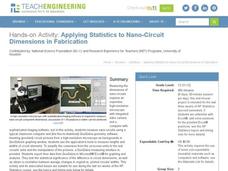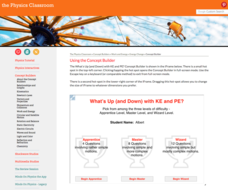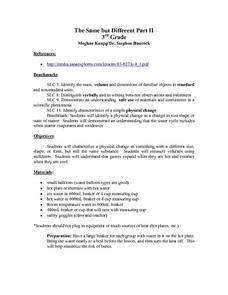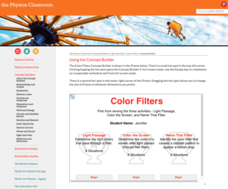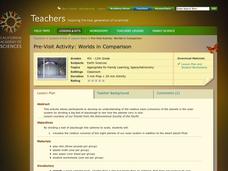Curated OER
The Study of Molecular Orientation by Linear Dimension Change of Polymeric Films
Students investigate the linear dimension change of heated plastic film and relate the results to processing and service use of the materials. They calculate percent change in dimension as related to anisotropy and molecular reorientation.
Physics Classroom
Being Impulsive About Momentum Change
Scholars quantitatively apply their knowledge relating impulse, force, and time in the collision of objects. Three progressive levels challenge pupils with different ways of analyzing these problems. They identify multiple collision...
Teach Engineering
Applying Statistics to Nano-Circuit Dimensions in Fabrication
Do flexible circuits change dimensions during fabrication? Groups use GeoGebra software to measure the length of pictures of flexible nano-circuits. To determine if the circuits change dimensions, future engineers use Microsoft...
Physics Classroom
Change of State
Free-body diagrams display all forces acting on an object, helping scientists represent Newton's Laws of Motion. Scholars read a short description of motion and view the free-body diagram to begin the installment of a larger series on...
Physics Classroom
Know Your Potential
Never underestimate potential—electric or your own. Scholars apply a color scheme based on the changes in electric potential as part of a series on electric circuits. They consider splitting wires, light bulb placement, and voltage as...
Columbus City Schools
What’s Up with Matter?
Take a "conservative" approach to planning your next unit on mass and matter! What better way to answer "But where did the gas go?" than with a lab designed to promote good report writing, research skills, and detailed observation....
Physics Classroom
What's Up (and Down) with KE and PE
Physics class has its ups and downs ... especially when it involves energy concepts! Scholars analyze information to determine changes in kinetic and potential energy using an interactive resource. Realistic scenarios make connecting...
Teach Engineering
Statistical Analysis of Flexible Circuits
Scholars connect statistical analysis with flexible electric circuits. They first learn about flexible circuits and their applications through a PowerPoint presentation and then consider how the fabrication process for these circuits...
Curated OER
The Same, But Different Part II
Learners characterize a physical change as something that changes to a different size, but retains its basic substance. They measure volumes using milliliters, and perform an experiment that proves that gases expand when hot and contract...
National Nanotechnology Infrastructure Network
Synthesis and Characterization of CdSe Quantum Dots
Does the size of a sample change the physical properties of that substance? It turns out it can! Young scientists combine physics and chemistry to synthesize CdSe quantum dots and record their color properties. Learners should...
Curated OER
How Big Is That Star?
Aspiring astronomers study stars. They compare stars and explain the relationship between radius, mass, and diameter. By creating a star simulation, they discover how a binary star system's orbit can cause changes in the observed...
Physics Classroom
Color Filters
Filters provide amusing changes to images in applications other than just Instagram! High school pupils apply their knowledge of colored filters to three different interactive sets of puzzles. They identify light colors that pass through...
Physics Classroom
Who Can See Who?
While only briefly mentioned in most Physics books, plane mirrors and their applications offer the basics necessary for future studies. While working through an interactive, pupils demonstrate knowledge of both reflection and its forms....
Teach Engineering
Airplane Tails and Wings: Are You in Control?
Keep everything under control. The lesson, the 16th segment in a 22-part unit, provides a more detailed look at the parts of a plane, specifically the control surfaces. Pupils learn about the construction of the wings and the tails and...
Pacific Science Center
Worlds in Comparison
Young astronomers follow a step-by-step procedure for dividing a lump of dough into parts, resulting in a scaled volume set of puny planets. Along with the printable directions is a template chart of planet names on which learners can...
LABScI
Vision Lab: The Eye
Our bodies have some amazing capabilities, but there are some limitations. Explore the limitations of the human eye through the eighth lab activity in a series of 12 biology lessons. Individuals measure their own peripheral vision...
Physics Classroom
Waves - Case Studies
What can your class tell about a wave just by looking at it? Using a simulation, physics pupils work through a series of case studies to determine the effects of speed, frequency, and density on waves. Part of a larger playlist on waves...
Polar Bears International
Taking Action!
Motivate young scientists to stand up and take action with this environmental science lesson. To begin, the class works in small groups brainstorming actions that support the conservation of the earth before creating and implementing an...
Curated OER
Problem Based Learning Scenario
Students research about the function of MPA's. For this marine science lesson, students explore how humans influence changes near these areas. They explore different MPA's in the Great Lakes region.
Physics Classroom
Light Intensity
Light intensity varies by the strength of the light bulb as well as the distance to the light bulb. Pupils apply these concepts independently at first. They must solve for the light intensity as either the distance or the wattage of the...
Physics Classroom
The L.O.S.T. Art of Image Description - Curved Mirrors
We see curved mirrors every day in spoons, rear-view mirrors, stores as a safety measure, make-up mirrors, and in novelty stores. Scholars explore the changes to an image based on the curve of the mirror, the location of the image, and...
Physics Classroom
Spectrum
Scholars relate each of the colors in the spectrum, except indigo, by comparing their frequencies, wavelengths, and energy levels. Then, they compare each section of the electromagnetic spectrum when considering the same three variables.
Curated OER
Space Math Differentiation-"Ch..Ch..Ch..Changes"
In this differentiation in space math worksheet, students use 6 different equations to solve 6 problems that involve differentiation related to astrophysics.
Curated OER
Measuring Speed in the Universe
For this measuring speed in the universe worksheet, students use photographs of 3 astronomical phenomena including supernova explosions, coronal mass ejections and solar flare shock waves to find how fast they move. The photographs show...


